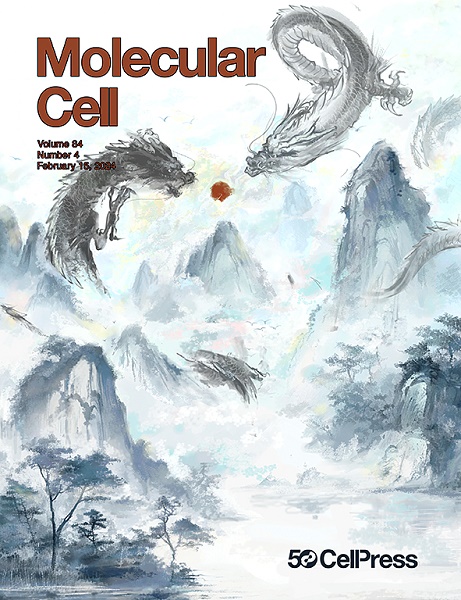核糖体通过广义移码和框外mRNA衰变调节转录组丰度
IF 14.5
1区 生物学
Q1 BIOCHEMISTRY & MOLECULAR BIOLOGY
引用次数: 0
摘要
细胞需要调整它们的转录组,以便在不断变化的环境中快速匹配细胞的需要。mRNA丰度可以通过改变其合成和衰变来控制。在这里,我们展示了在不良营养条件下,酿酒葡萄球菌的大部分转录组如何经历- 1核糖体帧移,并经历加速的帧外共翻译mRNA衰变。利用RNA代谢标记,我们证明在营养不良的条件下,无义介导的mRNA衰变(NMD)依赖的降解至少占总mRNA衰变的三分之一。我们进一步表征了这一机制,并确定低密码子最优性是核糖体诱导框外mRNA衰变的关键因素。最后,我们表明这种现象从细菌到人类都是保守的。我们的工作为直接调节反馈机制提供了证据,该机制将蛋白质需求与mRNA丰度的控制结合起来,以限制细胞生长,并拓宽了mRNA质量控制的功能领域。本文章由计算机程序翻译,如有差异,请以英文原文为准。

Ribosomes modulate transcriptome abundance via generalized frameshift and out-of-frame mRNA decay
Cells need to adapt their transcriptome to quickly match cellular needs in changing environments. mRNA abundance can be controlled by altering both its synthesis and decay. Here, we show how, in response to poor nutritional conditions, the bulk of the S. cerevisiae transcriptome undergoes −1 ribosome frameshifts and experiences an accelerated out-of-frame co-translational mRNA decay. Using RNA metabolic labeling, we demonstrate that in poor nutritional conditions, nonsense-mediated mRNA decay (NMD)-dependent degradation represents at least one-third of the total mRNA decay. We further characterize this mechanism and identify low codon optimality as a key factor for ribosomes to induce out-of-frame mRNA decay. Finally, we show that this phenomenon is conserved from bacteria to humans. Our work provides evidence for a direct regulatory feedback mechanism coupling protein demand with the control of mRNA abundance to limit cellular growth and broadens the functional landscape of mRNA quality control.
求助全文
通过发布文献求助,成功后即可免费获取论文全文。
去求助
来源期刊

Molecular Cell
生物-生化与分子生物学
CiteScore
26.00
自引率
3.80%
发文量
389
审稿时长
1 months
期刊介绍:
Molecular Cell is a companion to Cell, the leading journal of biology and the highest-impact journal in the world. Launched in December 1997 and published monthly. Molecular Cell is dedicated to publishing cutting-edge research in molecular biology, focusing on fundamental cellular processes. The journal encompasses a wide range of topics, including DNA replication, recombination, and repair; Chromatin biology and genome organization; Transcription; RNA processing and decay; Non-coding RNA function; Translation; Protein folding, modification, and quality control; Signal transduction pathways; Cell cycle and checkpoints; Cell death; Autophagy; Metabolism.
 求助内容:
求助内容: 应助结果提醒方式:
应助结果提醒方式:


